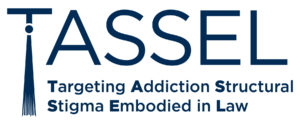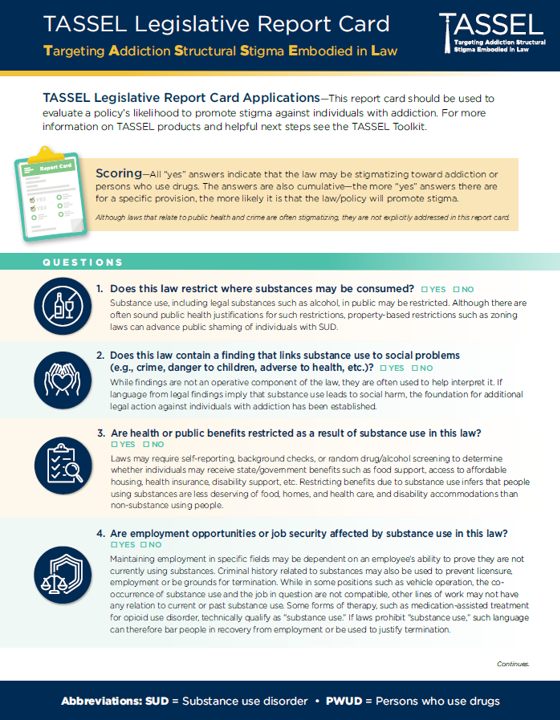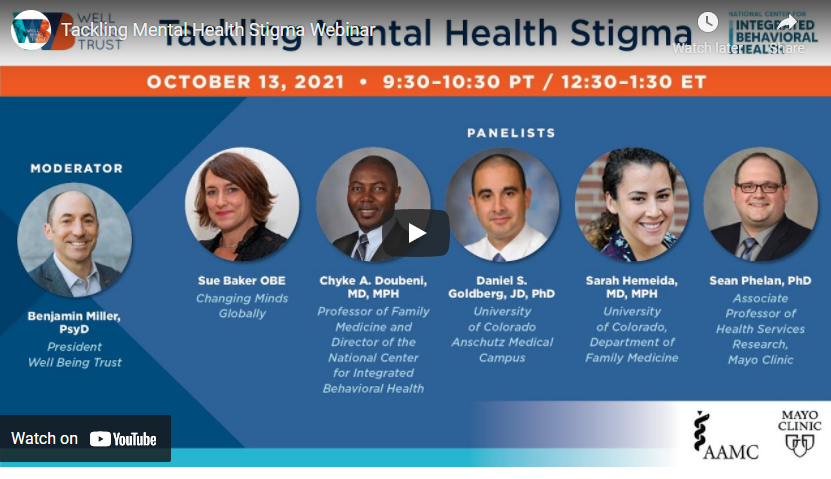
TASSEL is a legal epidemiological study piloted to evaluate California law at the local and state level to better understand structural stigma embodied in law as it relates to addiction stigma.
Stigma harms individuals with addiction and their families. Stigma exists at various levels, at the intra and interpersonal level (self-policing, shaming), within families and communities, and within the systems that govern our daily lives. Structural stigma is rooted in society’s operative systems including the laws and policies we use to guide our decisions, and daily procedures. Laws that unintentionally (and openly) stigmatize vulnerable communities often include policies that discriminate against individuals with addiction.
A critical note on terminology
The language used across resources and products are limited by their very nature, reflecting the contextual time in which they were written. Addiction is a highly sensitive topic for many, reflecting the inequities vulnerable communities have been subjected to. Care must be taken when attempting to address and empower communities that have been historically disenfranchised.
When utilizing the resources of this toolkit, users are asked to keep in mind that terminology changes quickly, especially in harm reduction spaces. The resources included in this toolkit were published at different timepoints and the language used may be dated but tied to useful resources written in good faith. The authors of this toolkit do not endorse all of the language used and recommend discernment and using person-first language.
TASSEL RESULTS AND TOOLKIT
This toolkit is designed for advocates, health professionals, local and state decision and policymakers. It includes products from the TASSEL project evaluation as well as other resources to assist users in understanding and identifying opportunities to influence policy and change culture related to addiction stigma.
The toolkit is organized into four sections:
- Influencing Policy and Creating Impact – Key policy messages and strategic policy solutions that resulted from completion of the TASSEL study.
- Addressing Stigma through the Lens of Cultural Change – A summary of documents to guide readers on the evidence of stigma and tactics to shift public understanding of addiction stigma.
- Cross Cutting Comprehensive Tools – Expansive toolkits from ChangeLab Solutions that provide blueprints for breaking down structural inequities through coalition building, community member engagement, tactics for messaging, and ultimately influencing policy
- Building Evidence – methodology and findings from the TASSEL project.
TASSEL LEGISLATIVE REPORT CARD
Stigma is an insidious and a powerful experience that is powerfully associated with worse health outcomes. Over the past decade, a growing body of research has demonstrated the means by which laws and policies mediate stigma. This report card will help identify whether a particular bill, law, or policy promotes stigma as it relates to addiction or persons who use drugs.
This report card will help identify whether a particular bill, law, or policy promotes stigma as it relates to addiction or persons who use use drugs.
Applications of this report card may include:
- Preparing for legislative testimony before committees;
- Preparation before meetings with representatives or when working with advocacy groups.
TASSEL'S CALL TO ACTION
We urge health professionals, executive officials, and policymakers leverage laws and policies to eliminate or reduce addiction stigma.
Stigma harms people who live with addiction. It makes their lives and the lives of those who care for them measurably worse. Fortunately, we have many anti-stigma tools that can help, but some are more likely to be effective than others. Laws and policies are especially promising tools because they target stigma upstream at its roots. And because stigma is linked with social inequities, structural solutions for addiction stigma are also
critical for advancing health equity.
The resources in this Toolkit enable leaders and changemakers to identify addiction stigma
in laws and policies at local, county, and state levels. Equipped with that knowledge, change agents can use the policy development tools offered here to eliminate laws and policies that fuel addiction stigma and strengthen or create laws and policies that reduce addiction stigma.
This study was led by researchers at the Colorado School of Public Health at the University of Colorado, Colorado State University, and the University of Northern Colorado.
Study authors: Sarah Hemeida, MD, MPH; Elinor Brereton; Hallie Conyers-Tucker; Lina Brou, MPH; and Daniel Goldberg, JD, PhD
For more information, contact Sarah Hemeida via email: sarah.hemeida@cuanschutz.edu.





